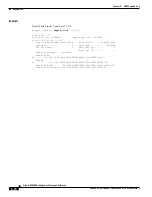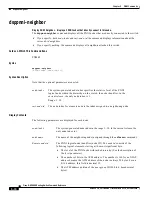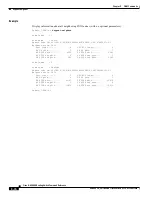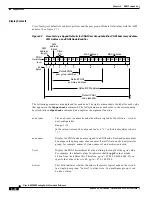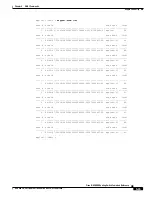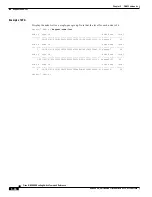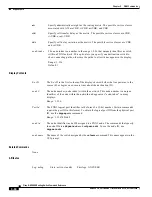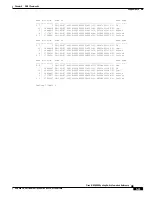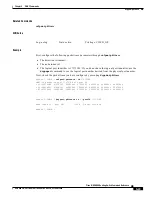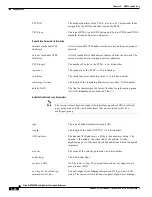
5-81
Cisco MGX 8850 Routing Switch Command Reference
Release 2.0, Part Number 78-10467-04 Rev C0, October 2001
Chapter 5
PNNI Commands
dsppnni-node-list
dsppnni-node-list
Display PNNI Nodes List
—
display a list of all learned PNNI nodes in the network.
The dsppnni-node-list command lists the PNNI nodes in the network that are visible to the current
switch. For a single-peer group (SPG), the displayed nodes exist at one level. For a multi-peer group
(MPG), the list contains all nodes on the current switch and all nodes that are visible to every node on
the current switch. The display for an MPG shows an ascending order of nodes based on the node
number. From the node list, you can create a graphical representation of the network. The display
contains the following information for each node:
•
The node number: all nodes in the network that are visible to the local node at a given level are
identified by a unique number and stored in a list.
•
The node ID is the 22 octet that uniquely identifies the node within the routing domain. See
addpnni-node or cnfpnni-node for components of the node ID.
•
The node level, also configured through either the addpnni-node or the cnfpnni-node command.
•
Node name (results from cnfname).
•
In a multi-peer group (MPG), the index number for nodes above the lowest level are added to the
node name.
Note
This display may not update frequently enough for you if you are configuring the network. You can
change timers to update more frequently, but changing timers can have unexpected effects. Before
you change any timers, discuss it with the TAC or your Cisco representative. The dsppnni-link
command frequently updates a display of the address, link, and Hello packet information of each link.
Cards on Which This Command Runs
PXM45
Syntax
dsppnni-node-list
Syntax Description
This command takes no parameters.
Related Commands
addpnni-node, cnfpnni-node, cnfname, dsppnni-path, dsppnni-reachable-addr
Attributes
Log: log
State: active, standby
Privilege: ANYUSER




